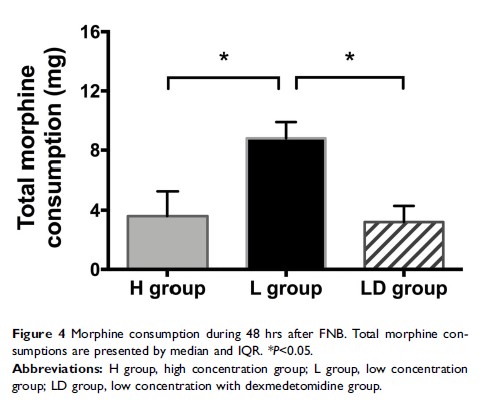9 0 5 7 8
论文已发表
注册即可获取德孚的最新动态
IF 收录期刊
- 2.6 Breast Cancer (Dove Med Press)
- 3.9 Clin Epidemiol
- 3.3 Cancer Manag Res
- 3.9 Infect Drug Resist
- 3.6 Clin Interv Aging
- 4.8 Drug Des Dev Ther
- 2.8 Int J Chronic Obstr
- 8.0 Int J Nanomed
- 2.3 Int J Women's Health
- 3.2 Neuropsych Dis Treat
- 4.0 OncoTargets Ther
- 2.2 Patient Prefer Adher
- 2.8 Ther Clin Risk Manag
- 2.7 J Pain Res
- 3.3 Diabet Metab Synd Ob
- 4.3 Psychol Res Behav Ma
- 3.4 Nat Sci Sleep
- 1.9 Pharmgenomics Pers Med
- 3.5 Risk Manag Healthc Policy
- 4.5 J Inflamm Res
- 2.3 Int J Gen Med
- 4.1 J Hepatocell Carcinoma
- 3.2 J Asthma Allergy
- 2.3 Clin Cosmet Investig Dermatol
- 3.3 J Multidiscip Healthc

右美托咪定作为佐剂添加至用于股神经阻滞的 0.1% 罗非卡因,对全膝关节置换术患者增强股四头肌肌力的效果:双盲随机对照试验
Authors Yang X, Kang W, Xiong W, Lu D, Zhou Z, Chen X, Zhou X, Feng X
Received 27 May 2019
Accepted for publication 31 October 2019
Published 17 December 2019 Volume 2019:12 Pages 3355—3363
DOI https://doi.org/10.2147/JPR.S217283
Checked for plagiarism Yes
Review by Single-blind
Peer reviewer comments 2
Editor who approved publication: Dr E Alfonso Romero-Sandoval
Background: Femoral nerve block (FNB) has been considered as an excellent analgesic modality in total knee arthroplasty (TKA) pain control. However, relatively high concentration of ropivacaine could lead to quadriceps muscle weakness and increase the risk of postoperative falls.
Objective: This double-blinded randomized controlled study was designed to investigate the effect of a combination of dexmedetomidine with a lower concentration of ropivacaine on quadriceps muscle strength and analgesic effect in FNB.
Methods: A total of 90 patients scheduled for TKA were randomized to receive continuous FNB postoperatively using 0.2% ropivacaine (H group), 0.1% ropivacaine (L group) or 0.1% ropivacaine combined with 2 μg/kg dexmedetomidine (LD group). Meanwhile, intravenous patient-controlled analgesia with morphine was administered to patients. The primary endpoint was the strength of quadriceps muscle evaluated by manual muscle testing (MMT) and Timed Up and Go test (TUG). The secondary endpoint was the pain scores and morphine consumption among different groups.
Results: For MMT, LD group showed higher quadriceps muscle strength than the other two groups (P <0.05) at 12 hrs postoperatively. TUG test was conducted to measure the walking ability, and showed that scores were significantly better in LD group than those in H group and L group (P <0.05) at 24 and 48 hrs postoperatively. There was no significant difference between H and LD group in the numeric rating scales (NRS) scores both at rest and at 45° flexion. The total morphine consumption in L group was significantly higher than in H or LD group (P <0.001).
Conclusion: Collectively, the addition of dexmedetomidine 2 μg/kg to 0.1% ropivacaine preoperatively would preserve quadriceps muscle strength with satisfactory analgesia in patients undergoing TKA. (This study was registered at ClinicalTrials.gov, identifier NCT03658421).
Keywords: femoral nerve block, dexmedetomidine, total knee arthroplasty, postoperative pain, muscle strength
